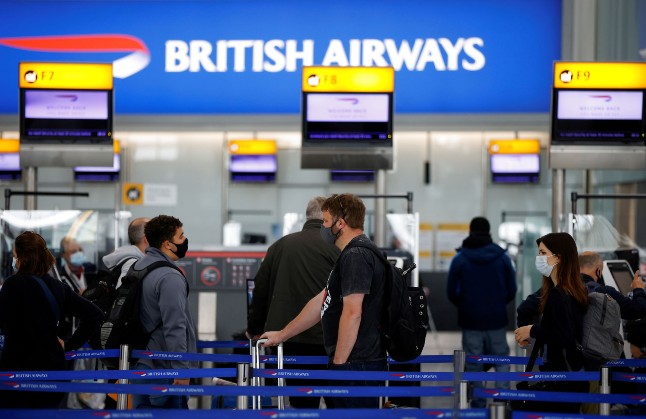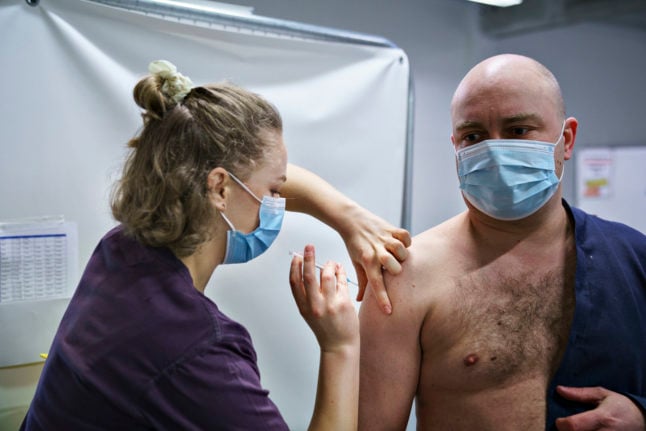UK restrictions
From 4am on August 2nd, the UK government any travellers from amber level countries – which include Denmark — arriving in Britain who have been fully inoculated with a vaccine recognised by the European Medical Agency or Swiss vaccination programme (Pfizer, Astra Zeneca, Moderna or Johnson &Johnson) can now skip the mandatory 10 day quarantine.
However, travellers (apart from children under 10) will still need to provide a negative test no more than three days prior to travel.
UK rules allow either a PCR test or an antigen test of more than 97 percent specificity and 80 percent sensitivity – the rapid-result antigen tests available at pharmacies or testing centres around Europe meet this specification but most home-testing kits do not.
Travellers from Denmark to the UK will also still need to take a PCR test on the second day after arriving in the country (apart from children aged 4 and under).
For fully vaccinated travellers, after the new rules take effect, the Day Two test will mark the end of their Covid travel requirements, assuming it comes back negative.
Unvaccinated travellers, however, must quarantine for 10 full days and take another test on or before Day Eight of their stay.
It is important to note that for test and quarantine purposes, the day of arrival is counted as Day Zero. The following day is Day One, the day after that Day Two, and so on.
Proof of purchase of the second test must be included on the passenger locator form, which everyone over age 18 must complete and submit within the 48 hours before they travel. Anyone who fails to take this Day Two test faces a fine of up to £2,000.
And, yes, even if your stay is a short one, before you travel you will need to book and pay for tests for Day Two and – if required because you’re not fully vaccinated at the time of travel – Day Eight.
The UK does accept lateral flow or antigen tests for pre-travel requirements.
People can travel from amber list countries for any reason – there is no need to prove that your trip is essential and entry is not limited to UK nationals or residents.
The UK has confirmed that it will accept the EU Digital Covid Certificate, which is included as part of Denmark’s coronapas app, as proof of vaccination.
READ ALSO:
- UK to allow fully vaccinated travellers from Europe to skip quarantine (but not tests)
- Travel to Denmark: England, Northern Ireland and Greek holiday destinations upgraded in latest guidelines
- Will vaccinated UK residents be able to visit Denmark without quarantining after July 19th?
Denmark restrictions for England, Scotland and Northern Ireland
Denmark on July 17th classified the entire of England, Scotland and Northern Ireland as “red regions”, with only Wales classified as “orange”, meaning all non-essential travel is discouraged for Danish residents.
However, as the UK as a whole is still classified as “orange”, travellers from England, Northern Ireland and Scotland are still not treated as if they are coming from a “red” country.
This means they only need to meet the long list of “worthy purposes” for entering Denmark, which includes most business trips and family visits. You can read more about the specific rules and criteria for fulfilling a worthy purpose here.
In addition, under Denmark’s rules, those who are permanently resident in an OECD country ranked “orange” (such as the UK as a whole) and fully vaccinated or immune can travel to Denmark without a worthy purpose. This means that fully vaccinated or immune people can still travel to Denmark for tourism, wherever in the UK they are travelling from.
The vaccine is treated as valid by Denmark from 14 days after the final dose has been given. Those who have been previously infected are treated as immune from 14 days after a positive PCR test, with the immunity valid for 180 days.
Travellers from England, Scotland and Northern Ireland still face tougher testing and isolation requirements than those travelling from Wales, however.
Unlike travellers from Wales, they have to isolate for up to 10 days on arrival in Denmark, even if vaccinated, and will need to present a negative Covid-19 test less than 72 hours old prior to boarding their flights, and also take another test after entry to Denmark.
Travelling to Denmark from Wales
Travellers from Wales are only required to isolate on arrival in Denmark if they are not vaccinated or immune, or if they have visited a red region (eg, the whole of England, Scotland or Northern Ireland) in the ten days running up to their trip to Denmark.
Vaccinated or immune travellers from from Wales do not need to present a negative Covid-19 test, either before boarding the plane or on arrival in Denmark, but instead need to show proof that they have been fully vaccinated or previously infected.
Travellers from Wales who have not been vaccinated do not need to show a negative PCR test before boarding their plane, but do need to present a negative test less than 72 hours old at the border control in Denmark.
This can either be a negative PCR test less than 72 hours old at the time of entry, or an antigen rapid test less than 48 hours old, which can be obtained for free in Denmark in the arrival halls between your plane and border controls.
Travellers from Wales who have visited England, Scotland or Northern Ireland in the ten days leading up to their trip will need to fulfil the same requirement as travellers from these “red” regions.
The worthy purposes which allow travel from an orange country outside the European Union include:
- Work, business, studies etc.
- A job in Denmark
- Attending a business meeting
- Carrying out services or transport goods in or out of Denmark
- Being a seaman, aircraft crew member, or a diplomat
- Having a job interview in Denmark
- Being a pupil or student in Denmark (but only if physical presence is required)
- Having a traineeship in Denmark
- Attending a folk high school programme
- Having an au pair placement
There are also “private matters” which constitute a worthy purpose to enter Denmark. These include:
- Being a spouse, live-in partner, parent, grandparent, brother or sister, stepbrother or stepsister, child or grandchild of a person resident in Denmark
- Being spouse, live-in partner, parent of a Danish national resident abroad when you are travelling to Denmark together
- Being the spouse, live-in partner, child, or stepchild of a person sent by another state who holds a diplomatic passport or a similar document
- Being the parent of a minor living in Denmark
- Being the primary caregiver of a minor living in Denmark
- Being related to or in a relationship with a seriously ill or dying person in Denmark
- To participate in the birth of a child
- To continue treatment at a healthcare institution
- To attend a funeral or burial of immediate family members
- Owning property, a boat or a permanent place at a campsite in Denmark
Official guidance on testing and isolation requirements, as well as on the valid reasons for entry from orange countries can be found in English here



 Please whitelist us to continue reading.
Please whitelist us to continue reading.
Danes can enter the UK without having to quarantine for 10 days but if I enter Denmark from the UK I will have to quarantine for 10 days. Really unfair because people from the UK still can’t visit their families.
Denmark must take the UK of it’s Red List as there are many in the UK like me who have family in DK but are unable to see them without having to quarantine for 10 days.